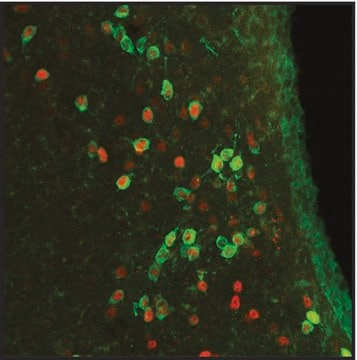A5979
Anti-ARP3 antibody, Mouse monoclonal
clone FMS338, purified from hybridoma cell culture
Synonyme(s) :
ARP3 Detection Antibody, Mouse Anti-ARP3
About This Item
Produits recommandés
Source biologique
mouse
Niveau de qualité
Conjugué
unconjugated
Forme d'anticorps
purified immunoglobulin
Type de produit anticorps
primary antibodies
Clone
FMS338, monoclonal
Forme
buffered aqueous solution
Poids mol.
antigen 40-45 kDa
Espèces réactives
human, mouse, rat, canine
Conditionnement
antibody small pack of 25 μL
Technique(s)
immunocytochemistry: suitable
indirect ELISA: suitable
microarray: suitable
western blot: 0.25-0.5 μg/mL using total cell extract of mouse myoblast C2 cells
Isotype
IgG2b
Numéro d'accès UniProt
Conditions d'expédition
dry ice
Température de stockage
−20°C
Modification post-traductionnelle de la cible
unmodified
Informations sur le gène
human ... ACTR3(10096)
mouse ... Actr3(74117)
rat ... Actr3(81732)
Description générale
Immunogène
Application
- enzyme linked immunosorbent assay (ELISA)
- immunocytochemistry
- immunoblotting
- immunoprecipitation
- immunofluorescence
- immunohistochemistry
Actions biochimiques/physiologiques
Forme physique
Clause de non-responsabilité
Not finding the right product?
Try our Outil de sélection de produits.
Code de la classe de stockage
10 - Combustible liquids
Classe de danger pour l'eau (WGK)
WGK 2
Point d'éclair (°F)
Not applicable
Point d'éclair (°C)
Not applicable
Certificats d'analyse (COA)
Recherchez un Certificats d'analyse (COA) en saisissant le numéro de lot du produit. Les numéros de lot figurent sur l'étiquette du produit après les mots "Lot" ou "Batch".
Déjà en possession de ce produit ?
Retrouvez la documentation relative aux produits que vous avez récemment achetés dans la Bibliothèque de documents.
Notre équipe de scientifiques dispose d'une expérience dans tous les secteurs de la recherche, notamment en sciences de la vie, science des matériaux, synthèse chimique, chromatographie, analyse et dans de nombreux autres domaines..
Contacter notre Service technique







